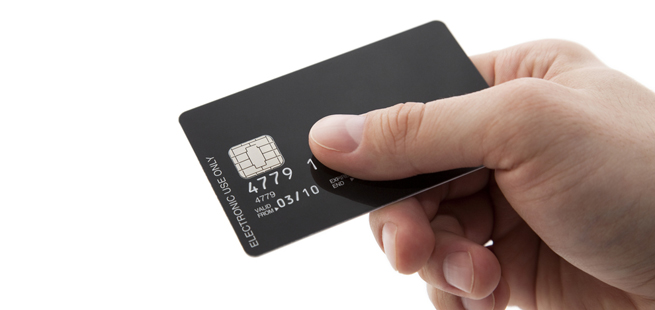
Credit cards are moving away from magnetic strips to more modern, no-contact technology. Now, with radio frequency identification (RFID) chips or near-field communication (NFC) cards, you can just wave your credit card in front of a reader to quickly pay for a cup of joe.
[aditude-amp id="flyingcarpet" targeting='{"env":"staging","page_type":"article","post_id":392585,"post_type":"story","post_chan":"none","tags":null,"ai":false,"category":"none","all_categories":"business,mobile,","session":"A"}']However, this ease could open up the doors for a new type of criminal. In theory, shady characters with portable scanners can read the information off your RFID card by getting close enough to you that your card is in their reader’s electromagnetic field. This type of theft hasn’t taken off yet, due to clunky technology and minimal monetary gain (most RFID and NFC cards have low spending caps), but an on/off trick could be a smart preventative step.
Researchers at the Pittsburgh Swanson School of Engineering are working on a simple new technology that would require customers to place their finger on the card to turn it “on” when they pay. When you place your finger on a specific spot on the card, say a logo or icon, it would complete a circuit and enable readers to charge the card. If the circuit isn’t complete, the card’s NFC or RFID technology would be disabled.
AI Weekly
The must-read newsletter for AI and Big Data industry written by Khari Johnson, Kyle Wiggers, and Seth Colaner.
Included with VentureBeat Insider and VentureBeat VIP memberships.
“Our new design integrates an antenna and other electrical circuitry that can be interrupted by a simple switch, like turning off the lights in the home or office,” explains professor Marlin Mickle in a statement. “The RFID or NFC credit card is disabled if left in a pocket or lying on a surface and unreadable by thieves using portable scanners.”
The extra step would take very little time for the customer, and researchers think the technology would be fairly easy and inexpensive for credit card companies to adopt. They recently filed a patent application for the on/off card technology.
VentureBeat's mission is to be a digital town square for technical decision-makers to gain knowledge about transformative enterprise technology and transact. Learn More
